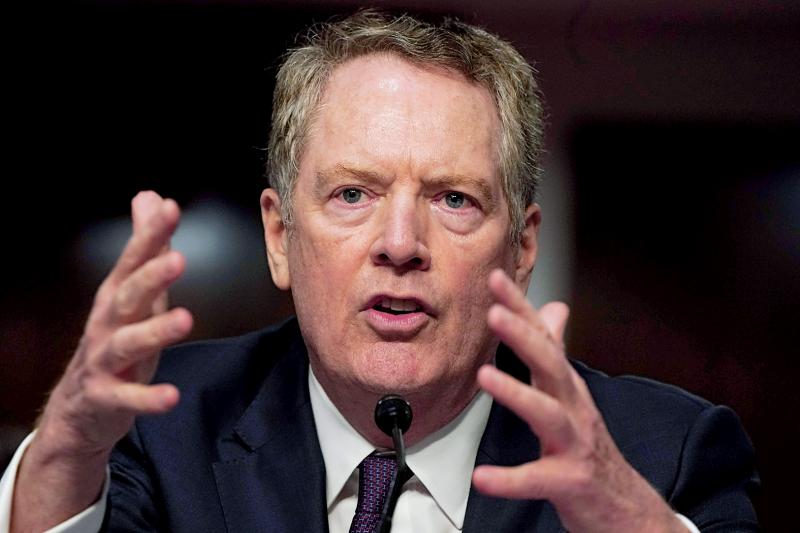US President Donald Trump on Thursday renewed his threat to cut ties with China, a day after his top diplomats held talks with Beijing, and his trade representative said that he did not consider decoupling the US and Chinese economies a viable option.
US Assistant Secretary of State for East Asian and Pacific Affairs David Stilwell described US-China relations as “tense” after their first high-level face-to-face diplomatic talks in months, although he said that Beijing did recommit to the first part of a trade deal reached this year and that the coming weeks would show if there had been progress.
Trump has made rebalancing the massive US trade deficit with China a top priority, but relations have worsened steadily as his campaign for re-election in November heats up.

Photo: AFP
“It was not Ambassador Lighthizer’s fault in that perhaps I didn’t make myself clear, but the US certainly does maintain a policy option, under various conditions, of a complete decoupling from China,” Trump wrote on Twitter, referring to US Trade Representative Robert Lighthizer.
Lighthizer on Wednesday had told a House of Representatives committee that he did not see that as viable.
“Do I think that you can sit down and decouple the United States economy from the Chinese economy?” he said. “No, I think that was a policy option years ago. I don’t think it’s a ... reasonable policy option at this point.”
US-China relations have reached their lowest point in years since the COVID-19 pandemic that began in China hit the US hard, and Trump and his administration have repeatedly accused Beijing of not being transparent about the outbreak.
Among multiple points of friction, the nations are also at odds over China’s moves to impose new national security legislation on Hong Kong, which has prompted Trump to initiate a process to eliminate special US treatment for the territory.
Trump last month made clear the deterioration in the relationship when he said that he had no interest in speaking right now to Chinese President Xi Jinping (習近平), whom he has hailed as a friend, and suggesting he could even cut ties with Beijing.
Lighthizer said that he expected to see more supply chains moving to the US because of tax and regulatory changes, but added that the US-China trade deal would result in significant positive changes, and increased Chinese purchases of US goods and services.
The phase 1 deal calls for China to buy US$200 billion of additional US goods and services over two years, but skeptics say the pandemic and resulting economic slowdowns would make it difficult for Beijing to reach its targets for this year.
US Secretary of State Mike Pompeo on Wednesday met Chinese State Councilor Yang Jiechi (楊潔篪) for a day of talks in Hawaii, but those appear to have done little to improve the mood.
Stilwell told reporters that China’s attitude in the talks could not be described as forthcoming and described relations as “tense.”
The Chinese Ministry of Foreign Affairs described the Hawaii talks as “constructive,” but said that Yang told Pompeo that Washington needed to respect Beijing’s positions on key issues, and halt its interference in matters such as Taiwan, Hong Kong and Xinjiang, while working to repair relations.

The CIA has a message for Chinese government officials worried about their place in Chinese President Xi Jinping’s (習近平) government: Come work with us. The agency released two Mandarin-language videos on social media on Thursday inviting disgruntled officials to contact the CIA. The recruitment videos posted on YouTube and X racked up more than 5 million views combined in their first day. The outreach comes as CIA Director John Ratcliffe has vowed to boost the agency’s use of intelligence from human sources and its focus on China, which has recently targeted US officials with its own espionage operations. The videos are “aimed at

STEADFAST FRIEND: The bills encourage increased Taiwan-US engagement and address China’s distortion of UN Resolution 2758 to isolate Taiwan internationally The Presidential Office yesterday thanked the US House of Representatives for unanimously passing two Taiwan-related bills highlighting its solid support for Taiwan’s democracy and global participation, and for deepening bilateral relations. One of the bills, the Taiwan Assurance Implementation Act, requires the US Department of State to periodically review its guidelines for engagement with Taiwan, and report to the US Congress on the guidelines and plans to lift self-imposed limitations on US-Taiwan engagement. The other bill is the Taiwan International Solidarity Act, which clarifies that UN Resolution 2758 does not address the issue of the representation of Taiwan or its people in

SHIFT: Taiwan’s better-than-expected first-quarter GDP and signs of weakness in the US have driven global capital back to emerging markets, the central bank head said The central bank yesterday blamed market speculation for the steep rise in the local currency, and urged exporters and financial institutions to stay calm and stop panic sell-offs to avoid hurting their own profitability. The nation’s top monetary policymaker said that it would step in, if necessary, to maintain order and stability in the foreign exchange market. The remarks came as the NT dollar yesterday closed up NT$0.919 to NT$30.145 against the US dollar in Taipei trading, after rising as high as NT$29.59 in intraday trading. The local currency has surged 5.85 percent against the greenback over the past two sessions, central

US Indo-Pacific Commander Admiral Samuel Paparo on Friday expressed concern over the rate at which China is diversifying its military exercises, the Financial Times (FT) reported on Saturday. “The rates of change on the depth and breadth of their exercises is the one non-linear effect that I’ve seen in the last year that wakes me up at night or keeps me up at night,” Paparo was quoted by FT as saying while attending the annual Sedona Forum at the McCain Institute in Arizona. Paparo also expressed concern over the speed with which China was expanding its military. While the US